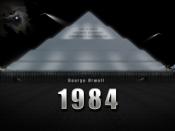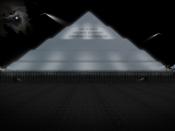The edges and borders of optimistic and pessimistic worlds clash and cross time and time again in George Orwell's 1984 and Aldous Huxley's Brave New World. Although, at first glance, the two tales of futuristic societies appear as different as black and white, the true modes of government glow in a similar shade of gray. Both books strive for an ultimate goal: stability, even though both societies take different approaches. Mr. Orwell and Mr. Huxley created their stories as a cry to the peoples of the world, cautioning them about the follies of a totalitarian government.
In 1984, the Inner Party acted as the highest power although they were below Big Brother. Big Brother played a role of an idea more than he did as a living person. The party loved him and treated him as a deity, but never in the book did he appear. Through the Inner Party, Big Brother laid down laws and punishments.
He obtained social control over the people through the use of telescreens, large television like boxes that could not be turned off and allowed the Party to tap into one's home at any time, brainwashing, the sheer threat of the thought police, and sending the children of Party members to schools with curriculum specially designed to mold them into perfect model citizens. With the use of victory gin, Newspeak, and the thought police, the people of Oceania remained in a constant state of stupidity, confused by the constant change of history and overrun by the complicated language created by the Party. By keeping its people stupefied, the Party gained more power to change history.
"War is Peace Freedom is Slavery Ignorance is Strength" Slapped everywhere, this phrase, so full of contradictions, became possible through the reality of doublethink. Doublethink is the single...


